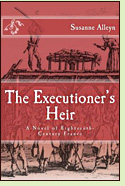The Executioner's Heir
by Susanne Alleyn
Reviewed by Margaret Donsbach

The Executioner's Heir is about the early life of Charles Sanson, chief executioner of Paris in the years leading up to the French Revolution. Historical evidence suggests Sanson was compassionate and gentlemanly. How did such a man reconcile himself to his work?
Charles is fourteen when his father introduces him to the rarely used heirloom sword designed and kept sharp for the beheading of nobility, who if convicted of capital offenses were spared the indignity of hanging. He is already an eager student of the executioner's other expertise - healing. Religious restrictions did not allow the dissection of human corpses, except those of criminals, so executioners were often far more knowledgeable about medicine than the doctors of their time. When Charles's father is incapacitated by a stroke, to keep the highly paid position of chief executioner in the family, his grandmother insists Charles take over his father's duties. Normally, the chief executioner's job is limited to overseeing his staff of assistants who carry out the actual work of torture and killing. Unfortunately, the politically motivated prosecution of a nobleman innocent of treason means the family sword may have to be brought out of retirement. If so, only the chief executioner has the high status to wield it. Meanwhile, in a town outside Paris, a rambunctious young religious skeptic and his friends are provoking the enmity of a town official.
Eighteenth-century executions were grisly - the guillotine was invented as a humane alternative - and The Executioner's Heir handles them in a frank but non-exploitive manner, raising questions that remain vital today. Can capital punishment ever be humane, given the risk of executing the innocent? Do the people who carry out executions have a responsibility to refuse if they learn a convict is innocent? Who does bear responsibility for such injustices: police officers and prosecutors, judges and juries, voters, every citizen who fails to speak out? (2013, 328 pages, including an Afterword about historical sources and a bibliography)
More about The Executioner's Heir at Amazon.comOther novels featuring executioners:
The Hangman's Daughter by Oliver Pötzsch (2008 in the original German), a mystery featuring a German hangman and his family as sleuths in a Bavarian village in 1659. See review or more info at Powell's Books
Palace of Justice by Susanne Alleyn (2010), includes a portrayal of Charles Sanson in his mature years in Paris at the height of the Revolution; #4 in the Aristide Ravel mystery series. See review or more info at Powell's Books
The French Executioner by C.C. Humphreys (2001), about a French executioner who dispatches Anne Boleyn. More info
The Memoirs of a Prague Executioner by Josef Svátek (1905), about an executioner in Prague during the Thirty Years War. More info
Nonfiction about capital punishment and executioners:
The Executioners by Robert Christophe (1961), a history of Paris's Sanson family of executioners. More info
The History of Torture and Execution by Jean Kellaway (2000), about methods of execution throughout history into the present day. More info
Discipline and Punish by Michel Foucault (1975), a study by a noted postmodern philosopher of the historical methods of punishing crime, from public executions to prisons, and the way these have reflected the changing social order. More info
Online:
Memoirs of the Sansons, an account, translated into English, of the Sanson family of executioners by Charles Sanson's grandson Henri; not always reliably accurate, but the fullest source of information about the Sanson family available.
Back to Novels of the Eighteenth Century
Back to Directory of Book Reviews